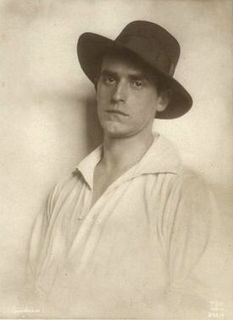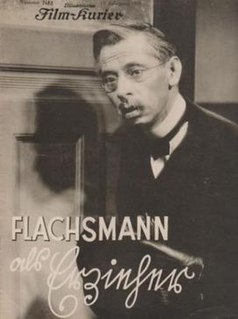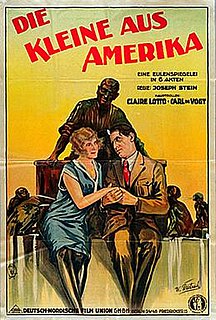Related Research Articles

Carl de Vogt was a German film actor who starred in four of Fritz Lang's early films. He attended the acting school in Cologne, Germany. Together with acting he was also active as a singer and recorded several discs. His greatest hit was "Der Fremdenlegionär". An extremely successful actor in his early career, he died in relative obscurity in 1970.
Cläre Lotto was a German film actress of the silent era. She appeared in 41 films between 1916 and 1933. She married German film actor Carl de Vogt, with whom she had a son with, Karl Franz de Vogt.
The Lord of the Beasts is a 1921 German silent drama film directed by Ernst Wendt and starring Carl de Vogt, Cläre Lotto, and Anna von Palen. It premiered in Berlin on 17 August 1921.

Distorting at the Resort is a 1932 German comedy film directed by Victor Janson and starring Maria Matray, Paul Hörbiger, and Otto Wallburg. A young woman wins a stay in a seaside holiday resort by winning a contest. However, once she arrives it is wrongly believed that she is an American millionaires.
Quarantine is a 1923 German silent film directed by Max Mack and starring Rudolf Lettinger, Helena Makowska and Loni Nest.
The Blonde Hannele is a 1924 German silent film directed by Franz Seitz and starring Maria Mindzenty, Carl de Vogt, and Helena Makowska.
The Mute of Portici is a 1922 German silent film directed by Arthur Günsburg. It is based on Daniel Auber's opera La muette de Portici.
Dawn or Red Morning is a 1929 German silent film directed by Wolfgang Neff and Burton George and starring Paul Henckels, Werner Fuetterer and Carl de Vogt.

The Seven Dresses of Katrin is a 1954 West German romantic comedy film directed by Hans Deppe and starring Sonja Ziemann, Paul Klinger, and Georg Thomalla. The film tells the story of a woman's life through seven dresses she wears.

At the Strasbourg is a 1934 German comedy film directed by Franz Osten and starring Hans Stüwe, Ursula Grabley, and Anna von Palen.

Rag Ball is a 1930 German comedy film directed by Carl Heinz Wolff and starring Harry Frank, Irene Ambrus, and Kurt Lilien. The title refers to a costume ball in which the guests turn up in tatters and rags.

Flachsmann the Educator is a 1930 German comedy film directed by Carl Heinz Wolff and starring Paul Henckels, Charlotte Ander and Alfred Braun.

The Path of Death is a 1917 German silent drama film directed by Robert Reinert and starring Maria Carmi, Carl de Vogt and Conrad Veidt. It marked the screen debut of Veidt. The film was shot in late 1916, but released the following year. It is a lost film.
The Oath of Stephan Huller is a 1921 German silent drama film directed by Reinhard Bruck and starring Anton Edthofer, Hanni Weisse and Alexander Areuss. It is based on the 1912 novel of the same title by Felix Hollaender.
The Terror of the Red Mill is a 1921 German silent film directed by Carl Boese and starring Aud Egede-Nissen, Otto Gebühr, and Alfred Abel.
The Game of Love is a 1924 German silent film directed by Guido Parish and starring Marcella Albani, Alfred Abel, and Carl de Vogt.
The Four Last Seconds of Quidam Uhl is a 1924 German silent drama film directed by Robert Reinert and starring Carl de Vogt, Helena Makowska and John Mylong. The film was not a success on its release.

The Girl from America is a 1925 American silent romance film directed by Josef Stein and starring Carl de Vogt, Hermann Leffler, and Cläre Lotto.
Ballettratten is a 1925 German silent drama film directed by Arthur Günsburg and starring Carl de Vogt, Cläre Lotto, and Victor Varconi.
In Thrall to the Claw is a 1921 Austrian silent film directed by Carl Froelich and starring Eugen Jensen, Gustav Diessl, and Julius Strobl. While visiting the set, future director Georg Wilhelm Pabst made his only ever screen appearance as an actor.
References
- ↑ Bock & Bergfelder p. 351